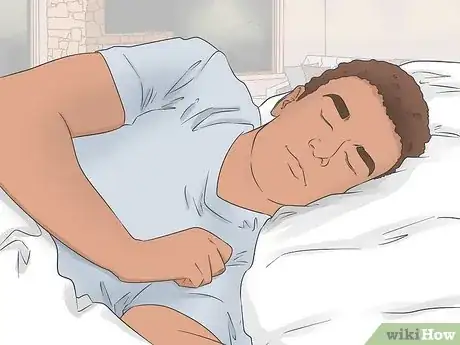X
wikiHow is a “wiki,” similar to Wikipedia, which means that many of our articles are co-written by multiple authors. To create this article, 28 people, some anonymous, worked to edit and improve it over time.
This article has been viewed 124,746 times.
Learn more...
Winning a game is great! However, if you don't prepare, your health could be at risk. Please continue reading for more information.
Steps
-
1Go to bed early so you can get a good rest for the next day. Try to get at least an extra hour of sleep. If you can, take a 10-20 minute nap before hand.[1]
-
2Drink at least 32 ounces of water a day. You may also consume sports drinks, but make sure they do not take the place of water. Remember, water is a necessity, while a sports drink is optional.Advertisement
-
3Start exercising as soon as possible.
-
4Eat a healthy diet at least 2 weeks before. That means very little junk food. Eat a lot of carbohydrates because they give you energy. Avoid high fiber during this time. On game day, drink nothing but water.
-
5Eat carbohydrates 2-4 hours before the game and drink water.[2]
-
6Run or practice the sport for at least 1-2 hours each day. This will help you do better when the game date arrives.
-
7Run a warm-up and stretch the day of the game. If you choose not to do this, you could get injured.
-
8Grab a bowl of fruit and a glass of water to get you refreshed before the game. Don't eat too much, just a snack.
-
9Stretch to avoid injury. It does no good to your team if you make excuses not to stretch, and you wind up very sore.[3]
Advertisement
Community Q&A
-
QuestionHow do I get faster at running?
 Community AnswerPractice every day. Run every day and increasing the distance. And, set up your timing to finish the distance you wish.
Community AnswerPractice every day. Run every day and increasing the distance. And, set up your timing to finish the distance you wish. -
QuestionShould the practice be before the game starts?
 Community AnswerYou should practice for many days before the game, and warm-up with a bit of practice before the game.
Community AnswerYou should practice for many days before the game, and warm-up with a bit of practice before the game. -
QuestionI'm 9 years old. How many hours of sleep should I get?
 Community Answer9-11 hours of sleep is a good amount for someone your age. For example, if you go to sleep at 9:00, you should wake up at least at 7:00 in the morning.
Community Answer9-11 hours of sleep is a good amount for someone your age. For example, if you go to sleep at 9:00, you should wake up at least at 7:00 in the morning.
Advertisement
Warnings
- Don't over-practice. You may get sore or even injured.⧼thumbs_response⧽
- Avoid exercising more than 3 hours a day.⧼thumbs_response⧽
Advertisement
References
- ↑ https://www.sleepfoundation.org/articles/sleep-athletic-performance-and-recovery
- ↑ https://www.cwu.edu/sports-nutrition/eating-competition
- ↑ http://www.humankinetics.com/excerpts/excerpts/stretching-is-beneficial-for-athletes
- ↑ https://www.asics.com/us/en-us/blog/article/6-winning-ways-athletes-mentally-prepare-for-competition
- ↑ https://www.hss.edu/conditions_dynamic-static-stretching.asp
About This Article
Advertisement
































































